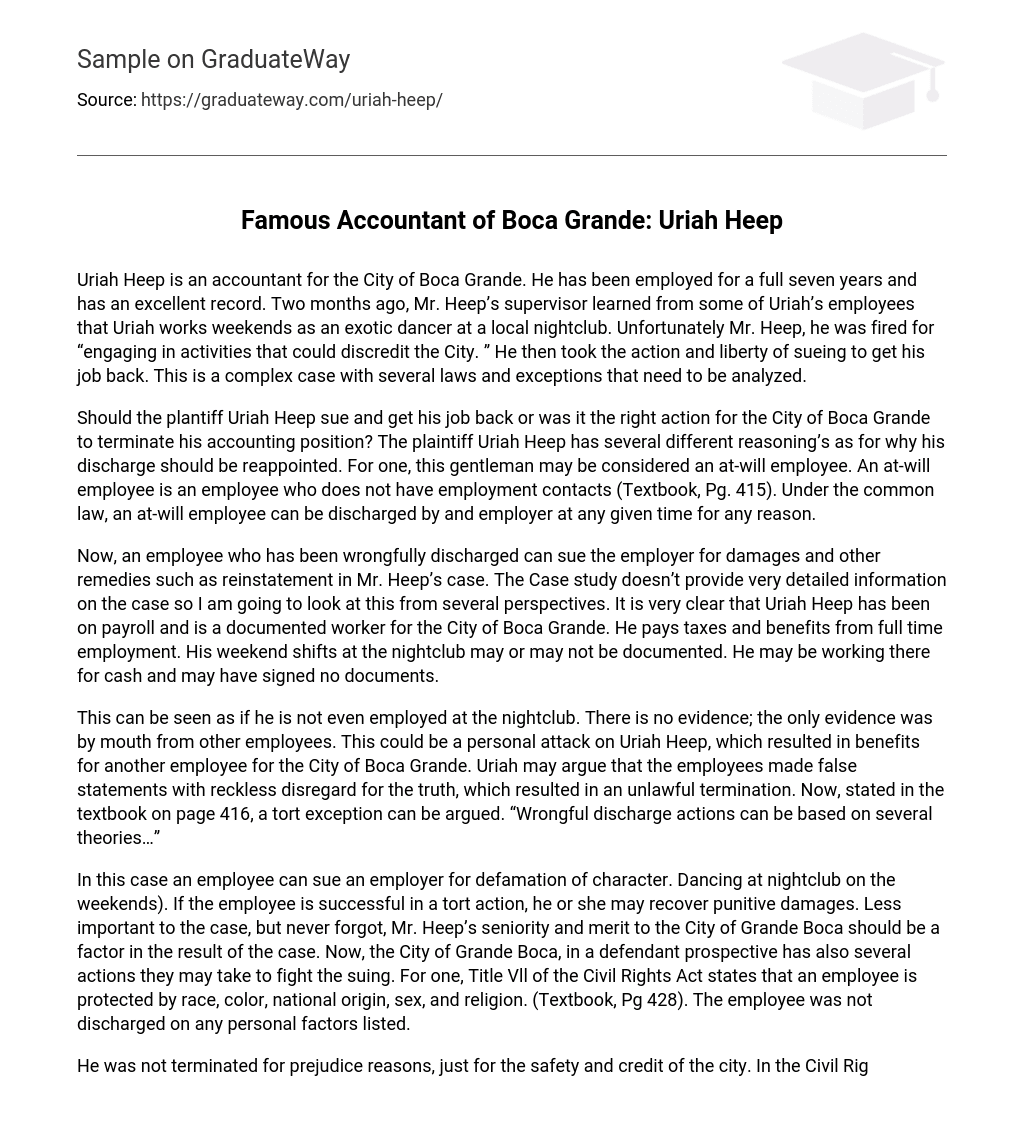Uriah Heep is an accountant for the City of Boca Grande. He has been employed for a full seven years and has an excellent record. Two months ago, Mr. Heep’s supervisor learned from some of Uriah’s employees that Uriah works weekends as an exotic dancer at a local nightclub. Unfortunately Mr. Heep, he was fired for “engaging in activities that could discredit the City. ” He then took the action and liberty of sueing to get his job back. This is a complex case with several laws and exceptions that need to be analyzed.
Should the plantiff Uriah Heep sue and get his job back or was it the right action for the City of Boca Grande to terminate his accounting position? The plaintiff Uriah Heep has several different reasoning’s as for why his discharge should be reappointed. For one, this gentleman may be considered an at-will employee. An at-will employee is an employee who does not have employment contacts (Textbook, Pg. 415). Under the common law, an at-will employee can be discharged by and employer at any given time for any reason.
Now, an employee who has been wrongfully discharged can sue the employer for damages and other remedies such as reinstatement in Mr. Heep’s case. The Case study doesn’t provide very detailed information on the case so I am going to look at this from several perspectives. It is very clear that Uriah Heep has been on payroll and is a documented worker for the City of Boca Grande. He pays taxes and benefits from full time employment. His weekend shifts at the nightclub may or may not be documented. He may be working there for cash and may have signed no documents.
This can be seen as if he is not even employed at the nightclub. There is no evidence; the only evidence was by mouth from other employees. This could be a personal attack on Uriah Heep, which resulted in benefits for another employee for the City of Boca Grande. Uriah may argue that the employees made false statements with reckless disregard for the truth, which resulted in an unlawful termination. Now, stated in the textbook on page 416, a tort exception can be argued. “Wrongful discharge actions can be based on several theories…”
In this case an employee can sue an employer for defamation of character. Dancing at nightclub on the weekends). If the employee is successful in a tort action, he or she may recover punitive damages. Less important to the case, but never forgot, Mr. Heep’s seniority and merit to the City of Grande Boca should be a factor in the result of the case. Now, the City of Grande Boca, in a defendant prospective has also several actions they may take to fight the suing. For one, Title Vll of the Civil Rights Act states that an employee is protected by race, color, national origin, sex, and religion. (Textbook, Pg 428). The employee was not discharged on any personal factors listed.
He was not terminated for prejudice reasons, just for the safety and credit of the city. In the Civil Rights Act, it is stated that most employees are at-will employees that can be terminated at any time as long as it does not violate the Title Vll employment discrimination laws. It is not stated in the case study, but it is very likely that Uriah Heep signed an employment contract upon entering his accounting position for the city. In a standard contract it lists reasons of termination, so we can assume it does in this specific employment contract.
In the eyes of the defendant, Mr. Heep has been putting the City of Grande Boca in jeopardy. Having him take action in adult dancing could ruin the image of the city that they have worked so hard to obtain. Now, I consider myself to be a flexible constructionist, meaning I see the law as a living document that can be altered in order to modernize its coverage and justice. I also believe in the theory of utilitarianism. This can be described as the following: “Persons choose the alternative that would provide the greatest to good and society. (Textbook, pg 190). The plaintiff, Uriah Heep is guilty and will not be reinstated as an accountant for the City of Grande Boca unless there is evidence that he was never a dancer at the nightclub. If the case was that he signed an employment contract, he scorned the contract and put the city of Grande Boca in jeopardy. If we has an at-will employee, the common law states, an at-will employee can be discharged by an employer at any time for any reason. To put the law aside, Mr. Heep’s job is a very serious job that must be performed in that fashion.
It was his decision to jeopardize his position as an accountant and dance at an adult club. The common law and Title Vll of the Civil Rights Act both support the defendant to prevail this case. I feel like this is a very simple case study, although there is a lack of information given in the description. I am not sure if there is written proof that Uriah Heep was in fact a dancer at this nightclub. An employee of the same hierarchy shouldn’t have the power to lead to a termination of another employee if there is no actually evidence.
To me this is still unclear. Also it isn’t stated in the description if he was an at-will employee or an employee under a contract. This is less important though since regardless he would be discharged, just in different manner. I feel as the judge I was fair and did the best I could with the information I was given. My decision was based off the law and did what I thought was most appropriate. I took into consideration the validity of the City of Grande Boca, and the opinions of Uriah Heep.





